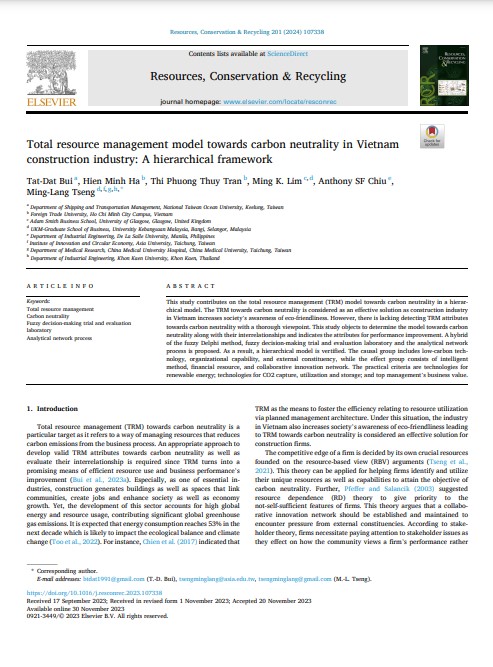
Keyword(s)
Author(s)
a) Tat-Dat Bui, b) Hien Minh Ha, b) Thi Phuong Thuy Tran, c,d) Ming K. Lim, e) Anthony SF Chiu, d,f,g,h) Ming-Lang Tseng
Country(ies)
Publisher
Published Date
Access
DOI
a) Department of Shipping and Transportation Management, National Taiwan Ocean University, Keelung, Taiwan,
b) Foreign Trade University, Ho Chi Minh City Campus, Vietnam,
c) Adam Smith Business School, University of Glasgow, Glasgow, United Kingdom,
d) UKM-Graduate School of Business, Universitiy Kebangsaan Malaysia, Bangi, Selangor, Malaysia,
e) Department of Industrial Engineering, De La Salle University, Manila, Philippines,
f) Institute of Innovation and Circular Economy, Asia University, Taichung, Taiwan,
g) Department of Medical Research, China Medical University Hospital, China Medical University, Taichung, Taiwan,
h) Department of Industrial Engineering, Khon Kaen University, Khon Kaen, Thailand
This study contributes on the total resource management (TRM) model towards carbon neutrality in a hierarchical model. The TRM towards carbon neutrality is considered as an effective solution as construction industry in Vietnam increases society’s awareness of eco-friendliness. However, there is lacking detecting TRM attributes towards carbon neutrality with a thorough viewpoint. This study objects to determine the model towards carbon neutrality along with their interrelationships and indicates the attributes for performance improvement. A hybrid of the fuzzy Delphi method, fuzzy decision-making trial and evaluation laboratory and the analytical network process is proposed. As a result, a hierarchical model is vertified. The causal group includes low-carbon technology, organizational capability, and external constituency, while the effect group consists of intelligent method, financial resource, and collaborative innovation network. The practical criteria are technologies for renewable energy; technologies for CO2 capture, utilization and storage; and top management’s business value.